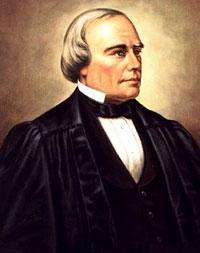The Volokh Conspiracy
Mostly law professors | Sometimes contrarian | Often libertarian | Always independent
Today in Supreme Court History: September 30, 1857
9/30/1857: Justice Benjamin Robbins Curtis resigns from the Supreme Court after Dred Scott v. Sandford (1857).

Editor's Note: We invite comments and request that they be civil and on-topic. We do not moderate or assume any responsibility for comments, which are owned by the readers who post them. Comments do not represent the views of Reason.com or Reason Foundation. We reserve the right to delete any comment for any reason at any time. Comments may only be edited within 5 minutes of posting. Report abuses.
Please to post comments


Some nuggets about Judge Curtis
- First Surpreme to graduate from Law Screw-el (Hah-Vud of course)
- Defended President Andrew Johnson at his Impeachment Trial in 1868
- Was in the running to be Chief Surpreme when it became available in 1874 but passed over by President Grant
-Resigned in part due to having to "Ride the Circuit" and the low pay ($6,500, My inflation calculator only goes back to 1913, $6,500 1913 translates to $212,000 today, current Surpremes make about $300K)
Frank
Curtis was lead defense counsel in the impeachment trial of President Andrew Johnson. After Curtis' death in 1874, Attorney General George Henry Williams, who had been a Senator during the trial, eulogized him in an address to the Supreme Court:
George Henry Williams, Ex-Justice Benjamin R. Curtis, in, Occasional Addresses 120, 120-21 (1895).
Alas, Williams' admiration of Curtis' arguments had gone only so far, as he voted to convict Johnson on all three counts considered by the Senate. (The House had submitted eleven articles of impeachment against Johnson, though the Senate only voted on three of them before adjourning the trial. The vote on every count was 35-19, one vote shy of the two-thirds necessary for a conviction.)
Dave Barry, in his classic book on American history, summarized the highlights of the Fillmore Administration:
The Earth did not crash into the Sun.
Ah. Even Homer nodded. Barry forgot that President Fillmore nominated Benjamin Robbins Curtis to the Supreme Court. Daniel Webster recommended him.
Curtis had a few notable opinions in his short tenure, including his famous dissent. A suitable position for a student of Joseph Story.*
Curtis kept busy after resigning, having an active practice, marrying three times, and having twelve children. Well, that also happened before and during his SCOTUS term. Still. Busy.
The bad feelings arising from Dred Scott were not the only reason he resigned. He also knew he would obtain much more money in private practice. He was the son of Lois Robbins and Benjamin Curtis, which explains each of his three names.
==
* Curtis also studied under John Hooker Ashmun, whom Louis Brandeis later praised as "a man of extraordinary legal acumen."
https://www.greenbag.org/v11n4/v11n4_brandeis.pdf
The most significant event of the Fillmore presidency was probably the Compromise of 1850, which quelled secession talk and likely postponed the Civil War a few years (until Dred Scott undid it.) His appointment of Brigham Young as the first territorial governor of Utah helped to cool a potentially tense situation and started the mainstreaming of Mormons into American society. On the international front, his sending Commodore Perry to Japan ended that nation's isolationism and brought it into the community of nations.
until Dred Scott undid it
among other things
Harvard University tapped for 500MM in fines. There goes the endowment return for the year. 🙁